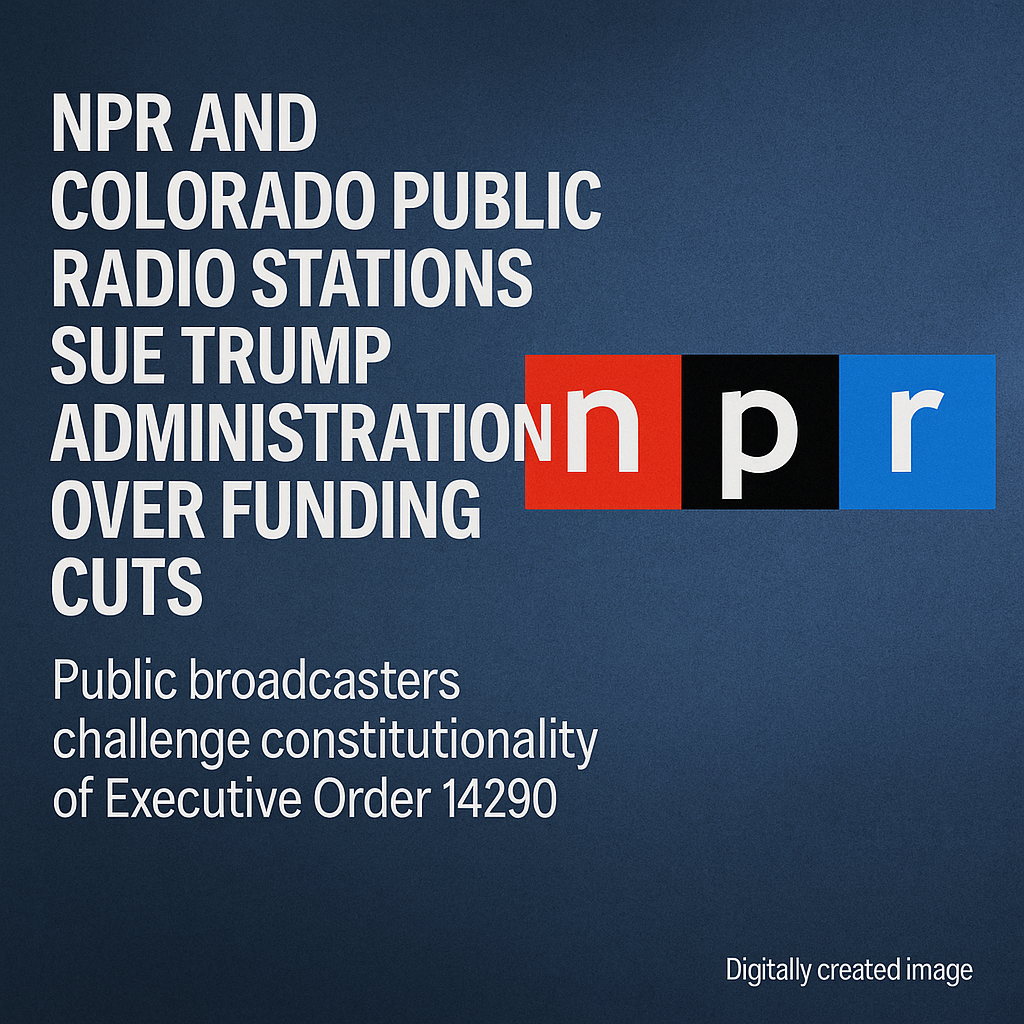Public broadcasters challenge constitutionality of Executive Order 14290
-
Key Points:
- NPR and three Colorado radio stations filed a lawsuit against the Trump administration.
- They argue that Executive Order 14290 violates the First Amendment and the Spending Clause.
- The Corporation for Public Broadcasting would be forced to stop funding NPR and PBS.
- Local stations serving Indigenous and rural communities would lose crucial support.
- Legal experts believe this could set a major precedent for media independence.
The executive order, signed by President Donald J. Trump on May 1, 2025, directs federal agencies to halt funding to NPR and PBS. This directive has sparked intense debate about its legality, constitutionality, and long-term implications for press freedom and public broadcasting in the United States.
National Public Radio (NPR) and three Colorado public radio stations—Colorado Public Radio, Aspen Public Radio, and KSUT Public Radio—have filed a high-profile lawsuit against the Trump administration. The legal challenge, submitted in the U.S. District Court for the District of Columbia, contests Executive Order 14290, titled “Ending Taxpayer Subsidization of Biased Media.”
The lawsuit names President Donald J. Trump, White House Budget Director Russell Vought, Treasury Secretary Scott Bessent, and National Endowment for the Arts Chair Maria Rosario Jackson as defendants. The plaintiffs argue that the order violates the First Amendment’s protections for freedom of speech, press, and association, along with the constitutional principles of the Separation of Powers and the Spending Clause.
A particularly forceful segment of the lawsuit cites the late Justice Antonin Scalia’s 1988 dissent: “But this wolf comes as a wolf.” This quote, plaintiffs argue, reflects the administration’s open retaliation against critical media coverage.
Under the order, the Corporation for Public Broadcasting (CPB)—which allocates over $500 million annually—must cease all direct and indirect funding to NPR and PBS. In addition, CPB’s 2025 grant eligibility guidelines have been revised to prohibit local stations from using federal funds to purchase NPR or PBS programming.
This policy shift is expected to severely impact NPR’s 246 member stations, many of which rely on federal grants for 8–10% of their annual operating budgets. The lawsuit warns of the potential collapse of the Public Radio Satellite System (PRSS), which distributes emergency broadcasts and programming to over 99% of the U.S. population.
The three Colorado plaintiffs each serve distinct communities: Colorado Public Radio reaches 90% of the state’s residents; Aspen Public Radio delivers robust regional news coverage; and KSUT Public Radio, founded by the Southern Ute Indian Tribe, serves Indigenous populations across the Four Corners area.
Adding to concerns, the National Endowment for the Arts has already complied with the order, pulling a $65,000 grant previously allocated to NPR. Although PBS has not joined the lawsuit, it is reportedly evaluating its legal options.
So far, the White House has not issued a formal response. Meanwhile, CPB insists it operates independently and is not under direct executive authority.
Legal analysts argue that this case could establish a critical precedent about executive overreach and the future of government-funded journalism. According to NPR, the case has garnered attention from civil liberties groups and media advocates across the country.
(With inputs from NPR and Court Filing)
A global media for the latest news, entertainment, music fashion, and more.














